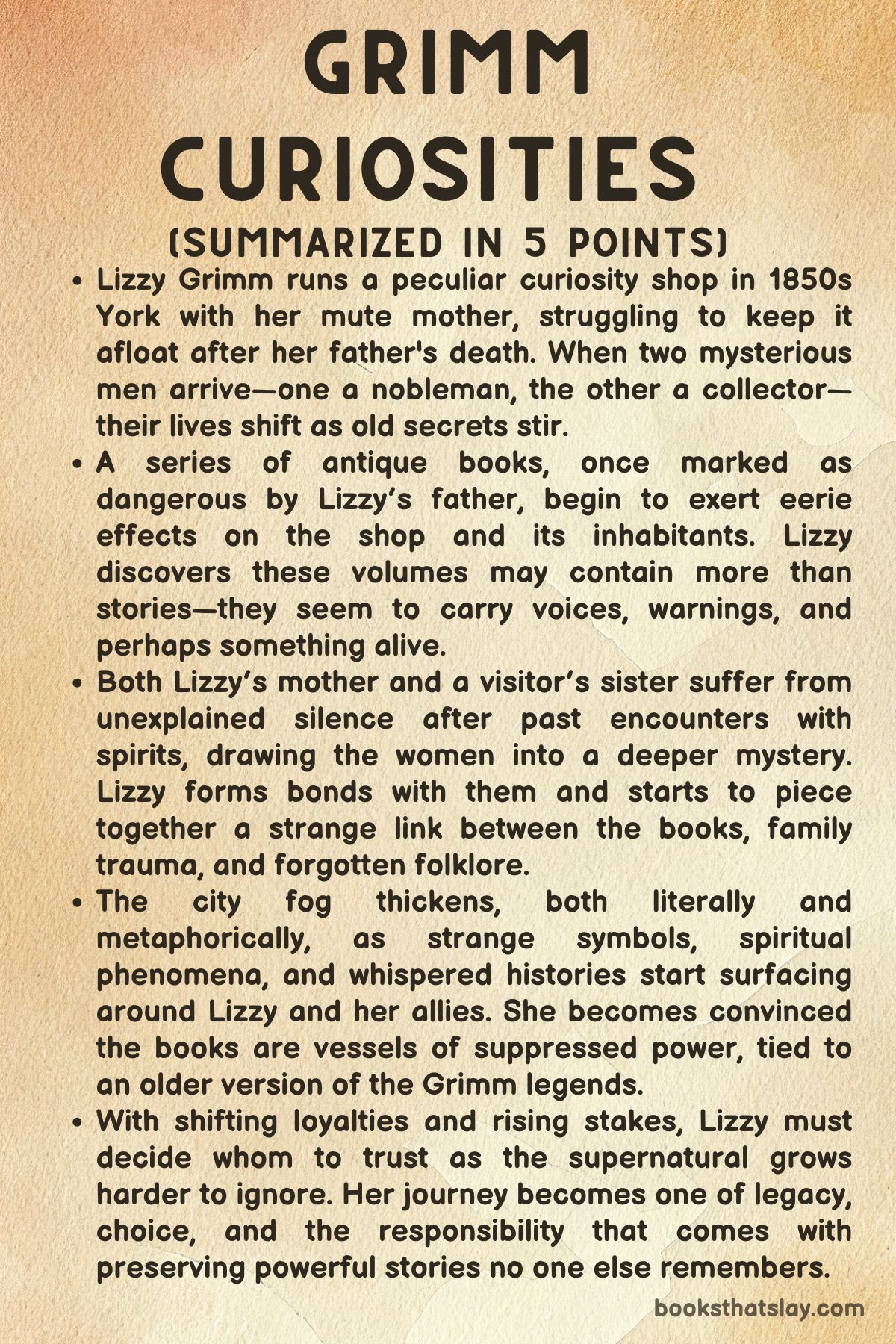Grimm Curiosities Summary, Characters and Themes
Grimm Curiosities by Sharon Lynn Fisher is a lush, gothic historical fantasy set in mid-nineteenth-century York, England. It follows Lizzy Grimm, a determined young woman struggling to maintain her family’s crumbling curiosity shop while caring for her catatonic mother.
In a setting layered with atmospheric detail, familial secrets, and supernatural threads, Lizzy’s story unfolds through mystery, romance, and the burden of legacy. The narrative explores themes of grief, resilience, and identity as Lizzy uncovers the eerie truth behind her family’s past and finds herself drawn into a deeper world of magical artifacts, ancestral knowledge, and forbidden love.
Summary
In the year 1851, in York, England, Lizzy Grimm is a young woman left to shoulder the burden of her family after the death of her father and the mental collapse of her mother. Once prosperous, their shop—Grimm Curiosities—now struggles to stay afloat.
Her father, Herbert Grimm, once ran the business with pride, specializing in mystical and unusual artifacts. After his passing, Lizzy’s mother found temporary fame and wealth as a medium.
But her final session in December 1850 ended mysteriously, leaving her silent and nearly comatose. Since then, Lizzy has kept the shop running, cared for her mother, and tried to hold their lives together, though they teeter on the brink of eviction and poverty.
During the Christmas season, Lizzy meets Antony Carlisle, a kind gentleman and the son of a baron. He arrives seeking spiritual guidance for his sister, Sophia, who has inexplicably lost the ability to speak—an affliction eerily similar to Lizzy’s mother’s.
Though Madam Grimm is no longer practicing, Antony’s gentle concern and respect touch Lizzy. He purchases a doll, leaving behind a generous payment, offering Lizzy a rare glimmer of hope.
Later, he and Lizzy find shared sorrow in their loved ones’ suffering and begin to form a tentative emotional connection.
At the same time, a mysterious man named Ambrose Stoke visits the shop and purchases a rare book from Lizzy’s childhood. He is intrigued by the collection of books published by Ginnel Press, written by the unknown “A.
A.” Lizzy later discovers the full set hidden in the shop, accompanied by a note from her father warning her not to sell them.
Still, their monetary value could resolve her financial woes. Torn between her father’s wishes and her family’s needs, she hesitates.
Ambrose returns and reveals he knew Herbert Grimm and that the books once belonged to him, though they were destroyed by his disapproving father. Ambrose offers to buy them at a generous price, but Lizzy continues to stall.
Meanwhile, her acquaintance with Antony deepens when he visits for tea. Their discussion is warm and respectful, and they uncover more surprising intersections in their lives—including shared experiences with Ambrose and the books.
Antony handles Lizzy with a care and deference she isn’t used to receiving.
The books themselves seem to be more than relics—they begin to exhibit supernatural properties. Mysterious drafts, unexplainable noises, and ghostly occurrences in the shop suggest spiritual activity.
As Lizzy investigates, she meets Miss Croft, a progressive female printer who reveals that the books published under A. A.
were written by none other than Herbert Grimm. This revelation shakes Lizzy’s understanding of her father and her family.
She realizes the books may contain clues to her mother’s silence and possibly Sophia’s condition as well.
Their efforts to find answers are complicated by societal pressure. Lizzy is offered a rare chance to attend a ball, but first must face Lord Carlisle, Antony’s father, who sternly warns her against involvement with his son.
Humiliated but defiant, Lizzy decides to attend the ball regardless. She wears a fine gown sent by Miss Stoke and captivates many attendees with her poise and beauty.
Ambrose proposes marriage during the ball, promising safety and financial stability. Lizzy, desperate to protect her mother and their shop, accepts.
Antony arrives too late to stop the engagement, and their final dance is filled with silent grief and unspoken words.
Soon after, Lizzy follows a trail into a forest, led by eerie clues and the scent of gingerbread. She finds a secluded lodge, hoping it might connect her to her father.
Instead, she uncovers a letter that changes everything. Her father once loved a woman named Mary Broadmoor—Ambrose’s mother.
They created the magical books together, but Mary was forced to marry another man. Lizzy discovers that Ambrose is her half-brother, and the engagement must be broken.
Antony arrives and confesses to breaking into Ambrose’s home, where he found disturbing evidence of supernatural experimentation. The pair uncover a hidden space beneath Ambrose’s house containing powerful artifacts, including a scepter and an urn of spirits.
These artifacts seem to be linked to the trances affecting both Lizzy’s mother and Sophia. The evidence points to Ambrose as the culprit—he used the books’ magical knowledge to trap the women in a dreamlike state.
Determined to end it, Lizzy and Antony track a secret doorway to Krampus, a Yule demon from folklore. They face the terrifying being, appease him with gingerbread, and narrowly escape.
Ambrose, however, traps them in a magical cabinet, hoping to banish them permanently. Lizzy pleads with him, revealing their shared bloodline.
Unmoved, Ambrose rejects her.
With determination and courage, Lizzy and Antony escape and return just as Krampus joins the Wild Hunt, taking Ambrose with him. The release of trapped spirits signals a shift.
Lizzy uses the scepter to revive her mother in a deeply emotional scene. With her mother restored, Lizzy turns her attention to Sophia, who also awakens, bridging the emotional gap between Antony and his estranged father.
As closure arrives, Herbert Grimm’s spirit appears, offering a silent farewell. His mysterious legacy, once shrouded in secrecy, has now been passed on.
Lizzy, now freed from deception and burden, looks ahead. She and Antony, united by experience, promise to face the future together—one built not only on surviving the past but understanding it.
The story ends with a sense of cathartic resolution, earned love, and spiritual peace.

Characters
Lizzy Grimm
Lizzy Grimm stands at the emotional and thematic heart of Grimm Curiosities, embodying resilience, courage, and the enduring pull of familial legacy. In the face of profound personal tragedy—her father’s death and her mother’s descent into silence—Lizzy assumes the mantle of both provider and caretaker, overseeing the once-thriving shop and protecting her family’s name and future.
She is depicted as deeply pragmatic, yet her practical nature does not eclipse her emotional depth or yearning for understanding and connection. Her interactions with Mr. Antony Carlisle reveal her capacity for tenderness and vulnerability, even as she carefully navigates the strictures of Victorian society. Lizzy is also intellectually curious and morally centered, evident in her reluctance to sell the mysterious books despite the dire financial situation, as well as her determination to uncover the truth behind her father’s secret life and the spiritual forces affecting her loved ones.
The moment she learns Ambrose is her half-brother—and that he manipulated both her and her mother through magical means—marks a devastating but pivotal turning point in her evolution. Ultimately, Lizzy emerges from the narrative changed yet unbroken, choosing to step into her future with clarity, strength, and a reclaimed sense of identity rooted in both magic and truth.
Antony Carlisle
Mr. Antony Carlisle is the epitome of the gentleman torn between heart and heritage.
Introduced as a baron’s son with a sincere demeanor and empathetic soul, he quickly becomes Lizzy Grimm’s confidant and emotional anchor. His initial visit to the shop, driven by concern for his mute sister, reveals not only his family’s struggles but also a quiet desperation for answers.
Throughout Grimm Curiosities, Antony distinguishes himself from other upper-class characters by his humility, thoughtfulness, and unwavering respect for Lizzy, despite their class differences. He listens, learns, and offers support rather than judgment.
His deepening relationship with Lizzy is marked by restrained affection and emotional intimacy, culminating in a dance of heartbreak and missed opportunity at the ball. While unable to act decisively in the face of his father’s disapproval, Antony later redeems himself by aiding Lizzy in her quest for the truth.
His bravery—seen in his confrontation with Ambrose and his entry into the world of the supernatural—underscores a fundamental transformation from passive nobleman to active protector and partner. By the novel’s end, Antony’s vow to face the future with Lizzy feels earned, signaling the merging of old-world decorum with a new, more emotionally engaged masculinity.
Ambrose Stoke
Ambrose Stoke is a character cloaked in mystique, whose transformation from cultured suitor to morally conflicted antagonist provides one of the most compelling arcs in Grimm Curiosities. At first, he appears as an enigmatic bibliophile, charmed by Lizzy and fascinated by her father’s collection.
His polite demeanor and generous offers mask a far more insidious truth: he is not only Lizzy’s half-brother, the product of her father’s former love, but also a manipulator of ancient magic, driven by obsession rather than affection. His romantic overtures to Lizzy, which culminate in a marriage proposal, are complicated by the revelation of their shared bloodline and his concealed intentions.
Ambrose’s descent into villainy is gradual but chilling—he imprisons Lizzy and Antony, attempts to sever them from the material world, and shows no remorse even when confronted with the truth of his origins. His fate—being taken by Krampus during the Wild Hunt—serves as poetic justice, a supernatural reckoning for his betrayal, misuse of power, and emotional violations.
Ambrose is a cautionary figure, illustrating how trauma, when unresolved, can curdle into destructive obsession.
Herbert Grimm
Though deceased at the story’s outset, Herbert Grimm exerts a powerful posthumous influence over the narrative. His legacy, shrouded in secrets and suppressed knowledge, slowly unravels to reveal a man who lived a double life—shopkeeper and devoted father by day, esoteric author and mystic by night.
Under the pseudonym “A. A.,” Herbert penned a series of magical books that serve as both literal and figurative gateways to other realms and deeper truths. His work with Mary Broadmoor and the books they created together suggest a man torn between duty and passion, caught in the sorrow of a love he could not claim.
Lizzy’s journey is, in many ways, a pilgrimage through her father’s past: seeking understanding, validation, and eventual closure. In the final moments, when Herbert’s spirit appears and smiles before vanishing, his redemption is felt not through his words, but through Lizzy’s healing and clarity.
Herbert’s character is emblematic of the generational shadows we inherit and the peace that can come when they are finally brought into the light.
Madam Grimm (Lizzy’s Mother)
The figure of Madam Grimm is steeped in tragedy and mystery. Once a renowned medium who drew crowds and wealth through her spiritual séances, she becomes nearly catatonic after a final, unexplained session, retreating from both speech and selfhood.
Her silence becomes a central enigma in Grimm Curiosities, symbolizing not just personal trauma but the deep and hidden costs of exposure to supernatural forces. Lizzy’s tireless care of her mother reveals the emotional and psychological toll such a responsibility demands.
Yet, in her rare moments of clarity—especially when reaching out to Antony or clasping Sophia’s hand—Madam Grimm shows glimmers of the person she once was, suggesting that her inner world is not entirely lost. Her eventual awakening, triggered by Lizzy’s use of the magical scepter, is one of the narrative’s most poignant moments, a reclamation of voice and agency after prolonged spiritual imprisonment.
Madam Grimm stands as a spectral embodiment of loss, sacrifice, and eventual resurrection, her journey mirroring the broader themes of memory and recovery that permeate the novel.
Sophia Carlisle
Sophia, Antony’s sister, serves as a mirror and silent companion to Madam Grimm. Like Lizzy’s mother, she falls into muteness following her mother’s death and a mysterious spiritual encounter.
Though she has minimal direct agency due to her condition, Sophia’s presence is deeply felt, her affliction driving Antony’s actions and catalyzing the bond between him and Lizzy. Her silence is not merely an ailment but a spiritual riddle tied to the mystical books and their influence.
The moment when she and Madam Grimm hold hands becomes a powerful image of unspoken connection and shared spiritual trauma. Sophia’s recovery near the story’s end, alongside Madam Grimm’s, signals not just a resolution to their individual sufferings but also a healing of the families fractured by grief and secrecy.
Her character underscores the story’s central message: that even those rendered voiceless by trauma may yet be restored through love, truth, and the unraveling of the past.
Miss Croft (Charlie)
Miss Croft, affectionately called Charlie, offers a welcome burst of unconventional energy within the rigid world of Grimm Curiosities. As a printer and a rare woman working in a male-dominated trade, she represents a form of quiet rebellion and self-assured independence.
Charlie quickly becomes a friend and supporter of Lizzy, encouraging her to attend the ball and face the world head-on despite societal limitations. Her role in unveiling Herbert Grimm’s identity as “A. A. ” is pivotal, providing Lizzy with both answers and a broader context for her father’s legacy.
Charlie’s blend of competence, warmth, and fearlessness makes her an empowering presence, standing as a counterbalance to the more oppressive figures within the novel. In a world where many women are silenced—literally or metaphorically—Charlie speaks, acts, and dares to live beyond constraint, embodying the possibility of agency in an otherwise restrictive society.
Lord Carlisle
Lord Carlisle, Antony’s father, embodies the oppressive weight of social hierarchy and patriarchal authority. Harsh, judgmental, and dismissive, he attempts to quash the burgeoning relationship between Lizzy and his son through intimidation and scorn.
His confrontation with Lizzy is one of the most emotionally charged scenes in the novel, revealing not just his personal disdain but also the broader societal forces that seek to police and restrict women like Lizzy. However, his evolution over the course of the story, particularly following Sophia’s recovery and Antony’s growth, reflects the novel’s belief in the possibility of change—even in the most entrenched of figures.
While he never becomes warm or fully accepting, his eventual recognition of Lizzy’s value suggests a grudging respect born from necessity and newfound humility. Lord Carlisle is not redeemed, but he is softened—an obstacle that becomes, in time, a relic of a fading era rather than an ongoing threat.
Themes
Inheritance of Secrets and Legacy
The story of Grimm Curiosities explores how the burdens and truths of the past are passed down through generations, shaping present identities and moral decisions. Lizzy Grimm inherits not only her family’s business and financial woes but also a cryptic history steeped in the supernatural.
Her father’s dual identity as the secretive author “A. A.” and his forbidden love for Mary Broadmoor are revelations that force Lizzy to reassess her own place in the family’s lineage. These inherited secrets become more than just narrative twists; they redefine her understanding of herself, her responsibilities, and the people around her.
The books he authored—steeped in myth and imbued with spiritual energy—symbolize not only intellectual and mystical legacies but also emotional and ethical ones. Lizzy must decide whether to sell them for survival or protect them to honor her father’s enigmatic intent.
The tension between pragmatic needs and emotional duty encapsulates the broader theme of legacy, compelling her to choose how much of the past to preserve, reinterpret, or reject. Her eventual decision to use the magical scepter and urn of spirits left behind by her father reflects her acceptance of his legacy, but on her own terms.
Through these choices, the novel examines the complexity of familial inheritance, where truth is not a clear-cut treasure, but a challenge requiring moral clarity and emotional resilience.
Female Autonomy and Social Constraint
Lizzy’s journey throughout Grimm Curiosities is marked by the constant pressure to conform to the expectations of a patriarchal society, while simultaneously striving for personal agency. As a young woman left to manage a failing business and care for a catatonic mother, Lizzy stands in defiance of the Victorian ideal of passive femininity.
Her independence and strategic thinking are essential for survival, yet these same qualities provoke scorn from the social elite. The rebuke from Lord Carlisle underscores how women who assert themselves are perceived as threats rather than allies.
Lizzy’s internal conflict during the ball—navigating admiration, class disparity, and her own romantic inclinations—shows how deeply social constraints restrict emotional freedom. Even her initial decision to accept Ambrose Stoke’s proposal stems from a calculation of survival, not affection, showing how women were often compelled to choose security over happiness.
Her eventual rejection of the engagement, prompted by the shocking revelation of shared paternity, restores her personal agency and reflects a reclaiming of choice over obligation. The theme reaches resolution when Lizzy unites with Antony on equal emotional footing, not as a woman saved by a man, but as a partner who has endured and acted with strength.
This journey from constrained girlhood to autonomous womanhood speaks to the broader feminist subtext of the novel.
Grief and Emotional Paralysis
The novel presents silence—not just literal but emotional—as a dominant symbol of grief. Lizzy’s mother’s catatonia and Sophia’s muteness embody the inexpressible weight of loss and trauma.
These afflictions are not treated as simple ailments to be cured, but as manifestations of unresolved sorrow and suppressed spiritual energies. Lizzy, although not silent, lives in a state of emotional containment; her grief is buried beneath daily tasks and survival instincts.
Antony Carlisle’s quiet mourning for his mother and his protectiveness toward Sophia create a mirror through which Lizzy sees her own suppressed pain. Their connection is built not on dramatic declarations but shared quietude and mutual recognition of suffering.
The story’s supernatural elements—phantom drafts, moving books, and ghostly presences—act as metaphors for the emotional hauntings that pervade the characters’ lives. Healing does not arrive abruptly, but through incremental acts of trust, bravery, and spiritual confrontation.
When Lizzy uses the magical relics to awaken her mother, the moment is not only supernatural but deeply emotional—it signifies her reclaiming agency over a sorrow that once felt immobilizing. The book suggests that grief, when acknowledged and interacted with (even through magical means), can be transformed into a source of understanding and emotional liberation.
Supernatural as Metaphor for Psychological Discovery
While Grimm Curiosities is rich with ghostly apparitions, magical books, and haunted relics, the supernatural elements are not solely for atmospheric effect—they represent deeper psychological and emotional currents. The recurring appearance of the Ginnel Press books, the mysterious cabinet, and Krampus serve not only as plot devices but also as reflections of the characters’ inner turmoil.
The magical books are tethered to Lizzy’s memories of her father and her yearning to understand him; they are symbolic vessels of both wisdom and unresolved tension. The magical cabinet in which Lizzy and Antony are trapped signifies the claustrophobic limitations imposed by secrets and lies—escape is only possible through emotional revelation and truth-telling.
Krampus, as the Yule demon, is not just a creature of folklore, but a symbol of retribution, consequence, and fear—his pursuit of Ambrose is a form of justice that transcends legal or social frameworks. Lizzy’s journey into these supernatural domains coincides with her journey into repressed family histories and painful emotional truths.
The more she confronts the magic, the more she confronts herself and the complex emotional inheritance she carries. Thus, the supernatural becomes a mirror that reflects the buried parts of the psyche, making psychological healing a parallel to magical mastery.
Love, Sacrifice, and the Boundaries of Choice
The romantic thread between Lizzy and Antony Carlisle in Grimm Curiosities resists the traditional arc of Victorian love stories. Their bond is one of mutual care, quiet observation, and shared pain rather than grand gestures or societal approval.
However, love in this world does not exist in a vacuum; it is shaped, tested, and often distorted by economic hardship, class differences, and haunting family secrets. Lizzy’s initial rejection of Antony, and her reluctant acceptance of Ambrose’s proposal, arise not from a lack of affection but from the harsh calculus of necessity.
This sacrifice is portrayed not as tragic melodrama, but as the real consequence of constrained agency. Antony’s own silence and inaction—born from his father’s dominance and his own inner fears—mirror Lizzy’s internal conflict, making their love story one of missed opportunities and lingering hopes.
The final reunion between them is hard-won, built on a foundation of mutual truth and shared suffering. Their promise to face the future together, having survived lies, betrayals, and supernatural threats, frames love as a choice, not a given.
In this narrative, love is not the easy escape, but the reward for enduring hardship with integrity and empathy. It is a love grounded in emotional realism and mutual respect, rather than fantasy.


